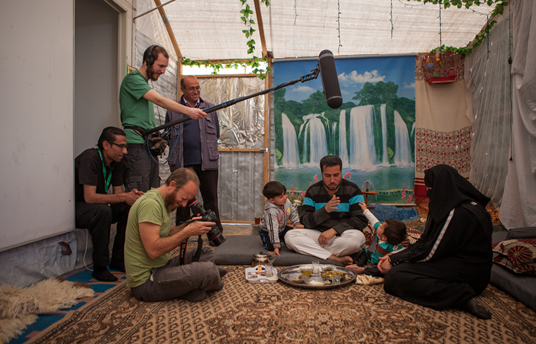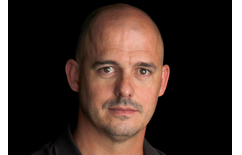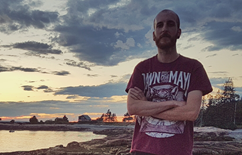2017
Short Documentary Lab

- Start date:
- Apr 14, 2017
- Ability Level:
- Intermediate. Applicants should demonstrate some experience in filming and storytelling.
Making a documentary is much more than simply filming what surrounds us. It can be a way of understanding the world, a tool to make it a better place, an art form where you can find your own voice. This intensive lab is designed to introduce young people to the world of documentary filmmaking. Through watching and discussing, they discover the possibilities of the genre. They learn new ways of looking at the reality that surrounds them, and where to find powerful and engaging stories. They are trained to open their eyes to what is going on around them as well as to themselves, helping them find their own unique way of telling stories that come from their world.
In small teams, students make short documentaries from initial concept to final product. By going through development, research, pre-production, filming and recording images and sounds, editing and post-production, students experience the complete process of making a film. Experienced professional mentors guide students throughout the filmmaking process. The goal of the lab is to provide new skills, to discover cinematic language, and to transform students into filmmakers who are ready to change the world and tell their stories.
Application Deadline
17 March, 2017
Dates:
14 April to 24 May, 2017
Friday: 2:00 – 7:00 PM
Saturday: 10:00 AM to 6:00 PM
Sunday through Wednesday: 5:15 – 9:45 PM
Thursday: no session
During pre-production and filming, participants may be asked to make time outside these hours, including on weekdays during the daytime.
Language
English
Group Size
Up to 16 participants
Lab Fee: 2,200.00 QAR
Programme Levels
Intermediate
Applicants should demonstrate some experience in filming and storytelling.
Schedule and Course Description
WEEK 1
Introduction to documentary filmmaking
Introduction to documentary filmmaking: exploration of documentary form, screenings and discussion.
Sessions involve all students.
Introduction to documentary filmmaking.
Definition of documentary.
Sub-genres within the documentary field.
Formats and new trends.
Why make documentaries?
Reality and point of view.
Looking inside yourself: what do you want to talk about?
Looking outside yourself: discovering reality.
Ethics in documentary filmmaking.
Overview of the creative process, from idea to the final product.
Relationship between you and reality during the process.
Relationship between your goal as filmmaker and the expected final product.
WEEK 2
Development of four projects
Based on the discoveries of the first week, students begin to work in smaller groups as four projects begin to take shape. The goal is for each group to pitch the project successfully, having generated a synopsis, treatment and basic production design.
Brainstorming, teamwork: ideas, approaches, selection of projects.
During the process, students learn the differences between subject, idea, theme, narrative device and approach.
Development of projects focuses on:
● Genre, style, language
● References, narrative structure, point of view
● Production design
The development sessions combine teamwork, individual work and meetings of teams: each team pitches its project while the other teams work as a soundboard, helping to improve the other teams’ projects.
WEEK 3
Pre-production
WEEK 4
Shooting
WEEK 5
Editing
WEEK 6
Post-Production and Lab Conclusion
By the end of the course, students will have created four documentary short films, which are screened for the class. As a group, we prepare distribution strategies. Then, based on their personal experience, each student proposes a new idea for another documentary. The lab ends imagining new films and defining the personal style of each student.
Submission Process
Applicants should submit a proposal of no longer than one page for a short documentary film (maximum duration 10 minutes). This proposal can be a simple idea or a theme; it must show the personal resonance and motivation of the student. Projects that have already been developed or filmed are not eligible. Applicants should provide the reasons they want to make the proposed film, and explain why they are the right person to tell the story they have chosen.
Submission Requirements
Please send the following as Word documents or in PDF format to doclab@dohafilminstitute.com, including your full name, email and contact number in all text documents:
1. Treatment (maximum one page)
2. Brief letter of intention explaining why you are applying to the lab (maximum one page)
3. Previous work or artistic portfolio (if applicable)
4. CV or short biography
5. Copy of Qatar ID
Selection of Candidate
Candidates whose work shows promise will be shortlisted. Shortlisted candidates will be invited for an interview with Institute and the lead lab mentor.
Class Participation
The importance of participation in this class cannot be overstated. Students should be prepared for every class and should always have their materials with them for presentation, discussion and in-class workshops, and should be prepared to contribute ideas or ask questions in every session. They should demonstrate the self-discipline, commitment and respect toward others that is necessary for successful creative explorations and film production within a team. They should show initiative, take responsibility for their own work, and be able to solve problems when plans do not turn out as expected.
Mentors
Pablo Iraburu
Lead Mentor

Pablo Iraburu is a documentary film director. After graduating from the University of Navarra with a degree in Information Sciences, he began a career as a cameraman, film editor and scriptwriter in many different formats, from music videos to fiction, dance and experimental films.
After discovering his vocation for documentary film, he directed and produced several documentaries about human issues around the world, among them the fall of Nicolae Ceaușescu in Romania, the Balkan Wars, AIDS in Malawi, the peace process in Guatemala, the Landless Workers Movement in Brazil, education projects in Peru, Nicaragua, Venezuela and Ecuador. He has also shot and post-produced documentaries on topics like leprosy in Mumbai, healthcare in the Peruvian Amazon, sustainable fisheries in Madagascar and fair trade in Côte d’Ivoire, among many others.
In 2000, he founded Arena Comunicación, a film production company that specialises in documentary filmmaking and audiovisual installations for museums. He has been Arena’s creative director since its launch.
Iraburu co-directed the documentary films ‘Nömadak Tx’ (2006), ‘Pura vida – The Ridge’ (2012), ‘District Zero’ (2015) and ‘Walls’ (2015), among others. He also directed the documentary television series ‘Everest Without Oxygen’. The common element in his projects is his approach to issues with a global reach accessed via a specific story, element or character.
He is Associate Professor of Documentary Film at the University of Navarra, and has given workshops and master classes in documentary film at festivals such as the International Documentary Festiva Amsterdam, Docs Barcelona Medellin, the Duhok Film Festival, DocsDF México and One World Praga.
Miguel García
Editor

Miguel García is an editor, cameraman and digital imaging technician (DIT) at the Spanish production company Arena Comunicación. Since 2009, he has edited and filmed numerous projects for Arena. Most notably, he acted as camera assistant, DIT and sound recordist on the feature documentary ‘District Zero’ (2015), an internationally acclaimed project produced for Oxfam and ECHO and filmed in Jordanian refugee camps. The film had its premiere at the San Sebastián International Film Festival.
He is currently working as sound recordist and camera assistant on the feature-length documentary ‘Together’, which is being filmed in the United States.
García also has experience as a cameraman and editor for NGO films, corporate videos, and films for the National Archaeological Museum of Spain, as well as the Museo de Málaga.